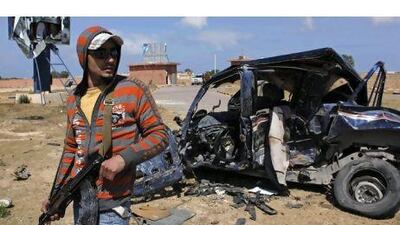NEW YORK // The search for a diplomatic solution to the conflict in Libya appeared stalled yesterday as coalition powers seeking to enforce the UN-sanctioned no-fly zone considered the case for arming insurgent forces fighting Col Muammar Qaddafi's better-equipped troops.
The UN Security Council, which authorised military action against the regime, was scheduled to debate the crisis again late last night after hearing a first-hand report from its special envoy to Libya, Abdelilah al Khatib.
Mr al Khatib spoke to rival leaders in Tripoli and rebel-held Benghazi against a background of scepticism that air strikes alone would force Col Qaddafi out of office. There was also concern about the rising human cost of the conflict.
Britain said yesterday that it would send telecommunications equipment to insurgents to help them withstand attacks by government forces. William Hague, the British foreign secretary, described the supplies as "non-lethal equipment which will help with the protection of civilian lives and the delivery of humanitarian aid".
Any plan to arm the rebels, who have struggled to counter Col Qaddafi's military muscle, would probably run into further opposition from Russia and China, which abstained in the first vote on the resolution.
Earlier, Libya's former colonial ruler, Italy, became the latest country to give formal diplomatic support to the rebels, announcing that it was following the lead of France and Qatar in recognising the national transitional council as Libya's only legitimate governing body.
The Italian foreign minister, Franco Frattini, dismissed attempts by the Qaddafi regime to open diplomatic channels in talks between Abdul-Ati al Obeidi, Libya's deputy foreign minister, and political leaders in Greece, Turkey and Malta.
Mr Frattini said after meeting the rebel council's foreign envoy, Ali al Essawi, that the only way to resolve the conflict was for Col Qaddafi to stand down and leave the country.
That message is thought to have been underlined in a telephone conversation between the British prime minister, David Cameron, and his Greek counterpart, George Papandreou.
The Italian minister's comments also ruled out any prospect of success for reported attempts by two or more of Col Qaddafi's sons to broker a negotiated settlement that would leave them in charge.
"Any solution for the future of Libya has a precondition: that Qaddafi's regime leaves ... that Qaddafi himself and the family leave the country," Mr Frattini said.
Mr al Obeida's statement, made on the Greek leg of his mission, that the regime was seeking an agreement with Britain, France and the US was "not credible" because it failed to deal with that precondition, he added.
The New York Times had reported that Saif al Islam Qaddafi and his brother Saadi could act as interim leaders if their father stepped aside. Rebel leaders were quoted yesterday as rejecting the suggestion outright.
As the UN prepared to receive its envoy's report, coinciding with yesterday's expiry of the extended deadline for US involvement in the air strikes, coalition states were pondering how the insurgents could be helped in trying to gain an upper hand against regime forces.
The UN resolution permitted "all necessary measures" to protect Libya's civilian population, but ruled out any occupation.
From the outset, some military analysts have argued that the wording of the resolution gave something approaching total flexibility to nations opposed to the regime's suppression of the rebels. But the coalition is under no illusion about the diplomatic risks of any widening of the military operation's aims and means.
While unanimous in imposing an arms embargo and sanctions, the 15-nation Security Council passed the resolution endorsing military intervention with five abstentions. Russia and China, each possessing the right to veto, have openly criticised the alliance of western and Arab nations behind the action against the Qaddafi regime.
As loyalist forces have repelled the rebel advance, the US, Britain and France have suggested arming the rebels, an ill-equipped mix of protesters and renegade soldiers who lack the experience, command structure and military hardware of Col Qaddafi's forces.
The US secretary of state, Hillary Clinton, has said there "could be a legitimate transfer of arms" into Libya - despite a UN embargo that prohibits moving weapons into the North African oil producer - if such a move would ultimately save civilian lives.
The US has reportedly sent in small CIA units to contact rebel leaders, but arming insurgents remains a divisive topic within the council and has been rejected by Portugal's UN ambassador, Jose Filipe Moraes Cabral, who chairs the Libyan sanctions committee.
Nestor Osorio, the UN ambassador for Colombia, which holds the Security Council's rotating presidency this month, said there were "different interpretations" of whether the arms embargo prohibited arming Libya's rebels and that the debate had yet to play out in the Manhattan-based chamber.
A senior UN diplomat said arming rebels needed a "clear legal basis" and warned against "embarking on a tricky route" of sending weapons without first having a "thorough sense" of the political forces that shape the insurgency. Analysts refer back to US support for rebels fighting Russian forces in Afghanistan who later formed al Qa'eda.
Reports from areas where rival forces are fighting for control of Libyan cities are mixed, but it is clear Qaddafi forces have made ground in key locations.
Government troops have besieged the city of Misurata, witnesses to the fighting reporting widespread death and injury caused by days of shelling from tanks and artillery.
One doctor said Qaddafi troops were in control of the port and a major street, while rebels held the centre of the city.
The humanitarian crisis continues to grow as residents clamour to leave the city. A Turkish ship picked up about 250 wounded people under the protection of Turkish warplanes was forced to leave hurriedly when thousands pressed forward on the dock.
Libya denies targeting civilians in the city and says it has attacked only "armed gangs" it claims are linked to al Qa'eda.
* Additional reporting by Reuters and the Associated Press.


